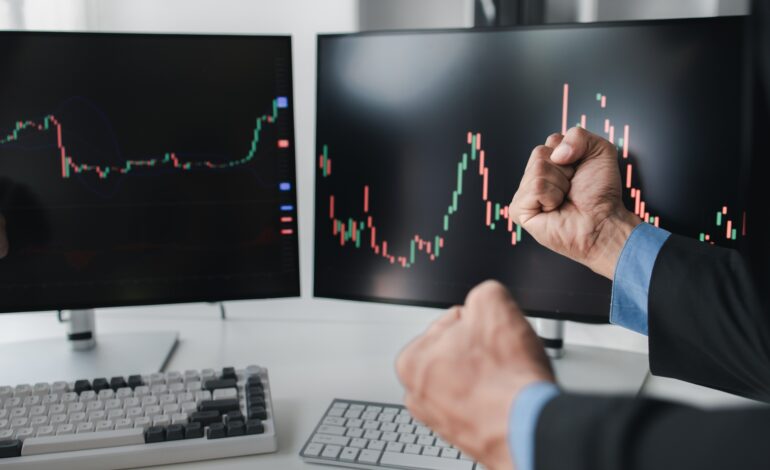
AI & Investing: How Artificial Intelligence is Changing the Stock Market in 2025
Artificial Intelligence (AI) has quickly become one of the most disruptive forces of our time. From self-driving cars to healthcare diagnostics, AI is transforming every industry—and the world of investing is no exception.
The stock market has always been driven by data, emotions, and human decision-making. But in 2025, with AI’s ability to analyze massive amounts of information in real time, investors are witnessing a complete shift in how markets operate, how portfolios are managed, and how wealth is built.
So, how exactly is AI reshaping the stock market? And can AI really help investors make better financial decisions? Let’s dive deep.
What is AI Investing?
AI investing refers to the use of machine learning, algorithms, and automation to make investment decisions. Instead of relying solely on human judgment, AI systems process millions of data points—including stock charts, financial statements, news headlines, and even social media posts—to predict market movements.
Some AI models can:
- Execute trades within milliseconds.
- Spot hidden patterns in historical stock prices.
- Adjust portfolios instantly when risks increase.
For investors, this means faster decisions, more efficiency, and less reliance on emotions like fear and greed.
How AI is Used in the Stock Market
AI is being applied in multiple areas of investing. Here are the most important ones:
1. Algorithmic Trading
AI powers high-frequency trading (HFT), where trades are executed in fractions of a second. These AI-driven algorithms look for price discrepancies and profit from them before human traders can even react.
- Example: AI bots can detect when a stock is being undervalued on one exchange and buy it instantly before the price adjusts.
2. Predictive Analytics
Machine learning models analyze historical market data, company earnings, and global economic indicators to forecast future stock prices.
- Example: AI models might predict that a company will beat earnings expectations based on past performance, supply chain data, and CEO statements.
3. Sentiment Analysis
AI scans news articles, financial reports, and even tweets to gauge investor sentiment. Positive or negative signals from the media can often trigger stock movements.
- Example: If AI detects overwhelmingly positive social media buzz about a new Tesla product, it may predict a short-term rise in Tesla’s stock.
4. Portfolio Management
Robo-advisors like Betterment, Wealthfront, and Vanguard Digital Advisor use AI to build and rebalance portfolios. They consider your age, risk tolerance, and goals to recommend the best investments—automatically.
5. Fraud Detection & Risk Management
AI is also helping brokers and financial institutions detect fraud, money laundering, and insider trading in real time—making markets safer for investors.
AI Tools Investors Are Using in 2025
Here are some of the most popular AI-powered investing platforms:
- Robo-Advisors: Betterment, Wealthfront, Vanguard Digital Advisor
- AI Stock Pickers: Trade Ideas, Kavout, Danelfin (AI-powered rankings)
- AI Hedge Funds: Renaissance Technologies, Numerai
- AI Assistants: ChatGPT-style financial bots that analyze balance sheets, summarize earnings calls, and answer investor questions
These tools make AI investing more accessible—not just for Wall Street, but also for everyday investors.
Advantages of AI in Investing
- Speed & Efficiency – AI reacts to market events in milliseconds.
- Emotion-Free Decisions – AI doesn’t panic during downturns or get greedy in bull markets.
- Data-Driven Insights – Processes billions of data points faster than any human.
- Personalized Strategies – AI customizes investment portfolios to individual goals.
- 24/7 Market Monitoring – Unlike humans, AI doesn’t need sleep.
Risks & Limitations of AI in Investing
While AI is powerful, it’s not perfect. Investors should understand its risks:
- Overreliance on Technology – Blindly trusting AI can lead to costly mistakes.
- Black-Box Problem – AI models are complex and not always transparent. Investors may not understand why a decision was made.
- Herd Behavior – If too many investors follow the same AI signals, it could distort markets.
- Data Bias – If AI is trained on biased or incomplete data, its predictions may be flawed.
- Cybersecurity Risks – AI-driven platforms can be targets for hackers.
AI vs Human Investors: Who Wins?
This question is hotly debated.
- AI Strengths: Speed, accuracy, removing emotions, analyzing massive datasets.
- Human Strengths: Intuition, creativity, ability to respond to unpredictable events (like wars or political crises).
Studies show that AI-driven hedge funds often outperform traditional funds in stable markets, but humans still add value during crises when creative decision-making is required.
The future is likely a hybrid approach—where humans and AI work together.
The Future of AI in Stock Market Investing
The next 5–10 years will likely bring:
- AI-Powered ETFs: Funds that rebalance themselves daily using machine learning.
- Quantum Computing + AI: Next-level predictions with lightning-fast analysis.
- More Retail Access: Everyday investors using AI tools that were once reserved for hedge funds.
- Voice-Based Investing: Asking your AI assistant, “Should I buy Apple stock?” and getting a full analysis in seconds.
AI won’t replace human investors entirely—but it will become an essential tool in every investor’s toolkit.
Final Thoughts
Artificial Intelligence is not just a buzzword—it’s transforming how we trade, invest, and build wealth. From robo-advisors to AI-powered hedge funds, the stock market in 2025 looks very different than it did just a decade ago.
Still, AI should be seen as a tool, not a replacement for human judgment. Investors who combine AI-driven insights with their own financial knowledge will likely see the best results.
The future of investing is clear: those who embrace AI will have a competitive edge.



